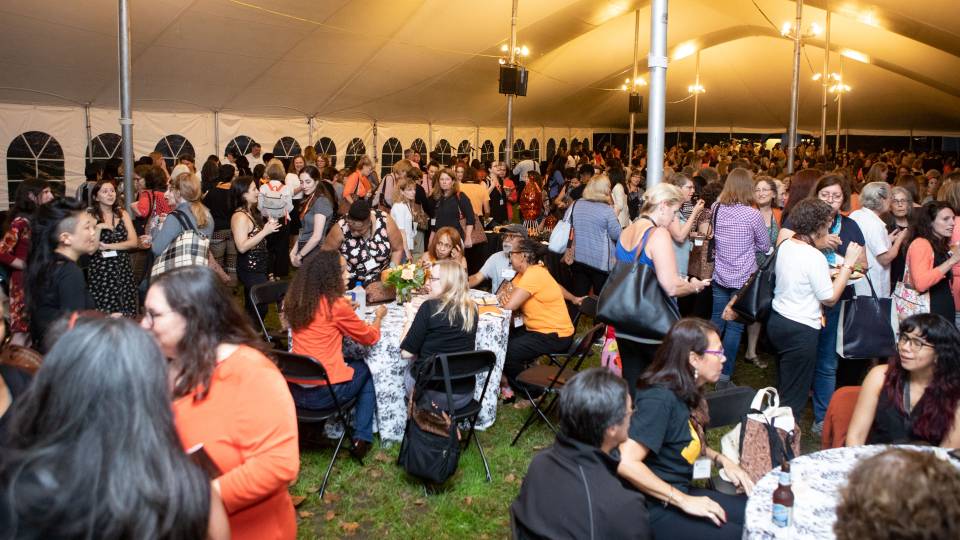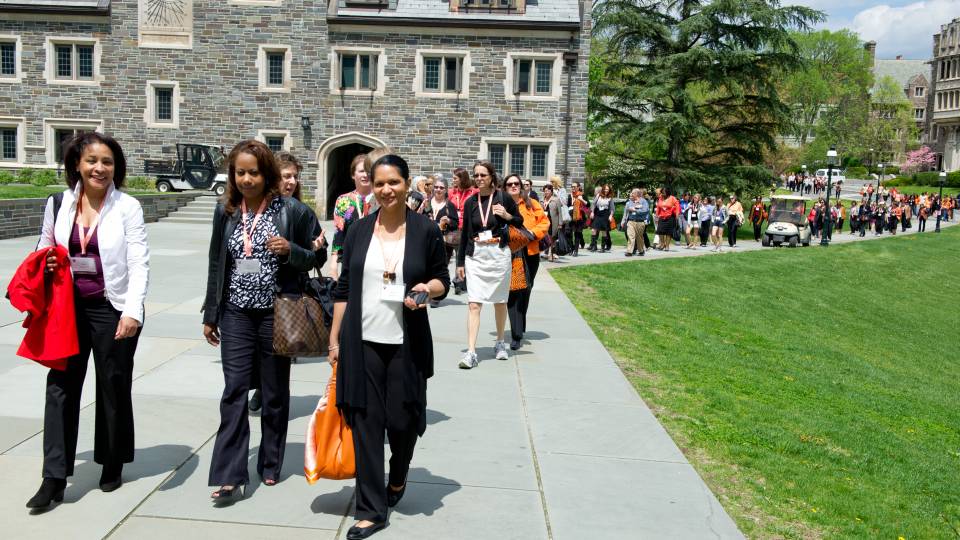The "She Roars" alumni conference celebrating women at Princeton kicked off the afternoon of Thursday, Oct. 4, with events spanning presentations by alumni, students and faculty; alumnae book readings; tours; and countless opportunities for Princetonians to get together. The conference, which is open only to registered alumni, runs through Saturday, Oct. 6. Below are some highlights captured across campus on day one.
Richardson Auditorium in Alexander Hall was a sea of orange and black and abuzz with alumnae talking, hugging, laughing and exclaiming as they reunited with friends — while finding their seats for welcome remarks by Jennifer Daniels, a 1993 alumna and president of the Alumni Association of Princeton.
Anne Judge Favaloro of Concord, Massachusetts, and Nancy Baird Harwood of Summit, New Jersey, both members of the Class of 1979, reminisced about their time at Princeton and how happy they are to be staying in town this weekend with their classmate Kathy Burks Hackett, executive director of Princeton Environmental Institute. "We've been friends since our first year at Princeton," said Favaloro. She added that she was most looking forward to hearing Justices Sonia Sotomayor and Elena Kagan speak on Friday.

Jennifer Daniels ’93, president of the Alumni Association of Princeton, welcomes “She Roars” attendees on the evening of Thursday, Oct. 4, in Richardson Auditorium.
Taking the stage, Daniels looked out on the crowd, grinned broadly and said simply, "Hello friends and welcome to She Roars," then paused as the crowd yelled and applauded loudly. "This is simply extraordinary." Noting that this conference is almost three times the size of the last She Roars conference, Daniels said attendees representing five decades of coeducation at Princeton from 1970 to 2018, were arriving from as far away as Hawaii and Alaska, from Canada to London, Hong Kong to Japan, Shanghai to India, New Zealand to Taiwan.
"It goes without saying that we come together at an important time in history when women are raising their voices and speaking," said Daniels, who is also chair of the Alumni Council. "From the highest courts in the land to the heights of education, and every level of government, in the boardroom and across industry, women Princetonians are making an impact."
After encouraging the crowd to "take a moment to celebrate Francis Arnold, Class of 1979, the first but certainly not the last, to receive the Nobel Prize," who was recognized yesterday for her work in chemistry, Daniels encouraged the crowd to enjoy the conference. "Explore, share, learn and then take what you have learned back to your families and communities. ... I look forward to connecting with you over the coming days as we roar together as one Tiger family!"

Doug McGrath ’80 presents on “They Didn’t Know Their Place: Adapting the Work of Jane Austen, Edith Wharton and the Life of Carole King.”
Filmmaker, playwright and essayist Doug McGrath, a 1980 alumnus, began his keynote "They Didn’t Know Their Place: Adapting the Work of Jane Austen, Edith Wharton and the Life of Carole King," by admitting that he was quite embarrassed in his first job after Princeton as a writer on "Saturday Night Live."
An English major and member of the Princeton Triangle Club, McGrath said all the other SNL writers "were making literary references I didn't understand." On the recommendation of a friend, he discovered Jane Austen and fell in love with the novel "Emma." He went on to adapt "Emma" for the Oscar-winning film starring Gwyneth Paltrow and Toni Collette and directed it. His adaptation of Edith Wharton's "The Age of Innocence," which had its premiere at Hartford Stage last spring, is playing at McCarter Theatre Center for the Performing Arts through Oct. 7. — Jamie Saxon

The remarks kicked off an evening of celebrating Princeton alumnae in the arts.
“We are living in a complicated, confusing, messy free speech environment.”
That is how Michele Minter, Princeton’s vice provost for institutional equity and diversity, opened the panel “How Do We Balance Free Speech with Civility?” in Richardson Auditorium on Thursday afternoon.

The “How Do We Balance Free Speech with Civility?” panel featured (from left) Carolyn Rouse, professor and chair of the Department of Anthropology; Keith Whittington, the William Nelson Cromwell Professor of Politics; and Michele Minter, vice provost for institutional equity and diversity. Whittington’s book “Speak Freely: Why Universities Must Defend Free Speech,” was this year’s Princeton Pre-Read book for all incoming first-year students.
The discussion also featured Carolyn Rouse, professor and chair of the Department of Anthropology, and Keith Whittington, the William Nelson Cromwell Professor of Politics. Whittington’s book “Speak Freely: Why Universities Must Defend Free Speech,” was this year’s Princeton Pre-Read book for all incoming first-year students.
Whittington said college campuses are precisely the place to practice and debate free speech.
“We should expect controversial ideas and controversial speech to be occurring on college campuses and we should be valuing college campuses precisely because of that,” he said. “We need to defend freedom of thought and defend freedom of inquiry. Colleges are a place for people to think through serious ideas in different ways.”
Minter said Princeton has policies that balance freedom of speech, such as the right to protest and demonstrate on campus, with values of inclusivity and respect.
“At Princeton, we refuse to allow free speech and inclusivity to be pitted against each other,” Minter said. Paraphrasing President Christopher L. Eisgruber, she added that if we are to have meaningful conversations about difficult topics on university campuses and in this country, we must care both about inclusivity and freedom of speech.

Alumnae listen intently at the Thursday afternoon panel in Richardson Auditorium.
In anthropology, Rouse said, scholars examine people’s beliefs and how people practice those beliefs. Free speech is not practiced absolutely, she said. “Saying what you want to whomever you want whenever you want is just not a thing,” she said. “Absolutist free speech can be a cause for chaos.”
Rouse said any discussion about free speech also must be examined from the perspective of power. “We cannot talk about speech without simultaneously talking about power. For those with institutional power, their words carry the weight of action,” she said. “For adults without institutional power, the stakes are high. Workers get fired for trying to exercise their free speech rights, such as trying to organize a union or whistleblowing.”
Alumnae asked the panelists about free speech in the age of social media and whether free speech and civility is possible. “Some of this comes down to basic manners,” Rouse said.
Minter ended the session by concluding that free speech is a complex issue and that colleges are the perfect place to figure out such complexities. “We are going to keep trying and I hope you all will help keep us honest,” she said. — Emily Aronson

From left to right: Ivy Thomas McKinney ’77, Evora Thomas ’74 and Daphne Thomas Jones ’77. The sisters are among the first undergraduate classes that included women at Princeton. They wore pins saying “The 3 Sisters.” The Thomas sisters were raised in Newark, New Jersey. Evora Thomas said: “For my 40th Reunion, the reception that women in my class received during the P-rade was amazing. Undergraduate women from younger classes just went crazy cheering for us as we marched by. That was the first time I realized what we had done as women integrating campus. You don’t realize how much ground you are breaking while you are doing it.”

Abby Klionsky ’14 shows Caroline Stone ’14 how to scan the QR code at the Betsey Stockton Garden outside Firestone Library.
In a discussion on "Entrepreneurship the Princeton Way," 1983 alumna Joy Marcus, a lecturer in entrepreneurship said, "Princeton is doing a lot to support women entering entrepreneurship now, and the results will really be seen in 10 years. As a University through the alumni network, we need to support the entrepreneurship ecosystem with our time and money."
Lynn Loo, a 2001 graduate alumna and the Theodora D. '78 and William H. Walton III '74 Professor in Engineering, said, "We will also leverage our strengths in the liberal arts and engineering over the next 10 years to set ourselves apart from schools experienced in entrepreneurship like Stanford and MIT."
Loo explained why she started a company around self-powering smart window technology: "With understanding the gravity and urgency of climate challenges, I felt it was important to do. It was a long time in the works. It was my grad student Nick Davy that really pushed to get the company established." — Wright Seneres

From left, Lynn Loo *01, Lynda Clarizio '82 and Joy Marcus '83 talk about "Entrepreneurship the Princeton Way."
As “She Roars” registration opened, Maclean House soon swelled with people. Navigating the hallways involved sidestepping crowds, skirting past friends reconnecting after years apart and weaving through a line of people with bags and suitcases of professional clothing in tow — not to be worn at the conference panels and festivities, but as donations for the Office of Career Services’ Tiger Threads program.
The official “She Roars” community service project, Tiger Threads was created to eliminate the barrier to participation in recruiting and other career-related events by providing access to quality business attire for Princeton students in need of a professional wardrobe. Started in 2016 by Career Services, the program relies on the generous donations of alumni and the community. The Office of Alumni Affairs and Career Services are collecting lightly worn, high-quality professional clothes donated by “She Roars” attendees throughout the conference.
“It’s important we all give back, and it’s something I’m happy I was able to do, " said Karen Ali, Class of 1978. — Michael Caddell

Karen Ali '78, participates in the Tiger Threads community service project.











